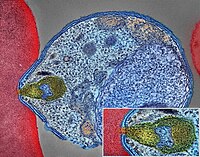
Photo from wikipedia
Background For a full treatment course of severe malaria, community-administered pre-referral rectal artesunate (RAS) should be completed by post-referral treatment consisting of an injectable antimalarial and oral artemisinin-based combination therapy… Click to show full abstract
Background For a full treatment course of severe malaria, community-administered pre-referral rectal artesunate (RAS) should be completed by post-referral treatment consisting of an injectable antimalarial and oral artemisinin-based combination therapy (ACT). This study aimed to assess compliance with this treatment recommendation in children under 5 years. Methods and findings This observational study accompanied the implementation of RAS in the Democratic Republic of the Congo (DRC), Nigeria, and Uganda between 2018 and 2020. Antimalarial treatment was assessed during admission in included referral health facilities (RHFs) in children under 5 with a diagnosis of severe malaria. Children were either referred from a community-based provider or directly attending the RHF. RHF data of 7,983 children was analysed for appropriateness of antimalarials; a subsample of 3,449 children was assessed additionally for dosage and method of ACT provision (treatment compliance). A parenteral antimalarial and an ACT were administered to 2.7% (28/1,051) of admitted children in Nigeria, 44.5% (1,211/2,724) in Uganda, and 50.3% (2,117/4,208) in DRC. Children receiving RAS from a community-based provider were more likely to be administered post-referral medication according to the guidelines in DRC (adjusted odds ratio (aOR) = 2.13, 95% CI 1.55 to 2.92, P < 0.001), but less likely in Uganda (aOR = 0.37, 95% CI 0.14 to 0.96, P = 0.04) adjusting for patient, provider, caregiver, and other contextual factors. While in DRC, inpatient ACT administration was common, ACTs were often prescribed at discharge in Nigeria (54.4%, 229/421) and Uganda (53.0%, 715/1,349). Study limitations include the unfeasibility to independently confirm the diagnosis of severe malaria due to the observational nature of the study. Conclusions Directly observed treatment was often incomplete, bearing a high risk for partial parasite clearance and disease recrudescence. Parenteral artesunate not followed up with oral ACT constitutes an artemisinin monotherapy and may favour the selection of resistant parasites. In connection with the finding that pre-referral RAS had no beneficial effect on child survival in the 3 study countries, concerns about an effective continuum of care for children with severe malaria seem justified. Stricter compliance with the WHO severe malaria treatment guidelines is critical to effectively manage this disease and further reduce child mortality. Trial registration ClinicalTrials.gov (NCT03568344).
Journal Title: PLOS Medicine
Year Published: 2023
Link to full text (if available)
Share on Social Media: Sign Up to like & get
recommendations!